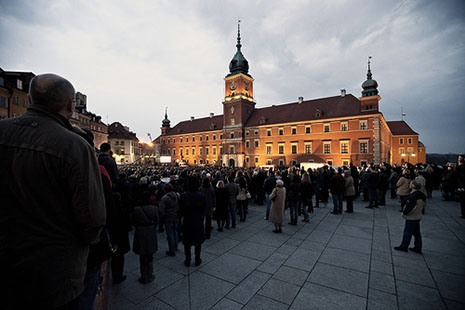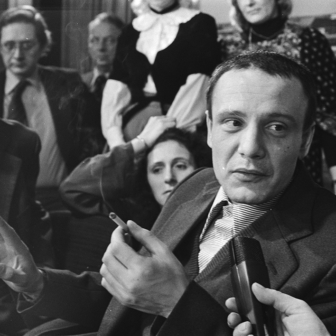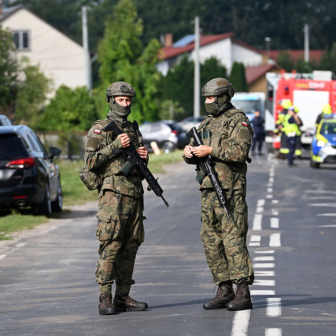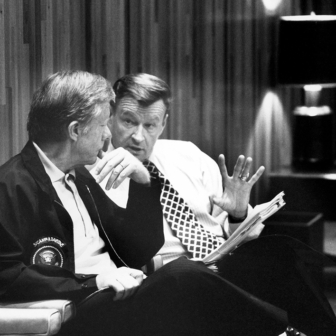Updated 6 July 2010
AT FIRST glance, the victory of the governing Civic Platform party’s candidate Bronislaw Komorowski in the Polish presidential run-off last weekend looks like a win for stability in Poland and a promise of warmer relations with its neighbours, notably Russia. But it is not clear if either country is yet ready for a long-term rapprochement.
In the end the race was so tight – with only 5 per cent between the two run-off candidates – that it may prove more of a victory for Komorowski’s opponent, Jaroslaw Kaczynski, the twin brother of the late President Lech Kaczynski, whose death in the tragic air crash at Smolensk in April triggered the election. The accident also took the lives of many of Poland’s political and military elite, who were on their way to commemorate the massacre of Polish officers by the Soviet secret police at Katyn in 1940. It seems to have contributed to Kaczynski’s surprisingly strong showing, and has reinforced a tentative thaw in relations between Poland and its largest neighbour, Russia. But support for the rapprochement in Poland remains fragile.
Both Komorowski and Kaczynski represent parties on the right of the political spectrum, but there the similarity ends. Kaczynski’s Law and Justice party is populist, clerical, strongly nationalist, even at times a shade xenophobic, and socially conservative – though on the economy it opposes privatization of communist-era enterprises and defends the welfare state. Civic Platform is more secular and centrist on social issues, but favours liberal economic reforms; externally, its nationalism is muted and it seeks cooperative relationships wherever possible, including with former adversaries.
Where Law and Justice has been acerbically Eurosceptic, Civic Platform has embraced the European Union and is trying to build Warsaw’s influence within that grouping by drawing closer to its key players. When Law and Justice used its period in government from 2005 to 2007 to begin to alter state institutions radically to create what it called a “Fourth Republic,” purged of the communist influences it claimed were endemic in the post-communist Poland, Civic Platform saw these efforts as sectarian and dangerously anti-democratic. Although both parties emerged from the communist-era dissident and Solidarity traditions, in which their leaders played prominent roles, the enmity between them has become sharp.
After winning the presidency from Law and Justice, the governing coalition headed by the Civic Platform premier, Donald Tusk, now holds all the key positions. The presidential veto, which Lech Kaczynski wielded regularly to block Tusk’s policies, has been neutralised. In theory Tusk should be able to press ahead with his domestic and external priorities unhindered.
But Jaroslaw Kaczynski’s strong showing suggests that Polish politics will remain polarised and evenly contested. Parliamentary elections are due next year, and Kaczynski now seems likely to lead his party to a strong showing there. And if he continues his present policy of seeking allies in the two post-communist parties – the Polish People’s Party (currently in the governing coalition led by Civic Platform) and the Democratic Left Alliance, whose stocks are again rising – he could quite possibly emerge after next year’s poll as the leader of a different coalition government. The situation until recently of a Civic Platform government in cohabitation with a Law and Justice president could be neatly reversed.
Initially the presidential campaign was remarkably mild. The horrifying air disaster that precipitated it, and the period of national mourning that followed, enveloped campaign exchanges in decorum and euphemism. The mutual hostility of the two main parties was briefly placed on hold. Kaczynski, an adroit but very forceful politician, presented himself as a changed man. Belying his reputation as a Russophobe, he appealed for reconciliation with the Russian people in a special internet message addressed to them. He also called for an end to “the war of Poles on Poles” (in which he had always been the key combatant), and subtly distanced himself from the aggressive campaign tactics of many of his followers.
Media aligned with the Law and Justice party were less magnanimous, producing conspiracy theories alleging official Russian involvement in the crash, even accusing Civic Platform leaders of complicity in a “second Katyn.” Though not terribly plausible to outsiders, this was strong, mobilising stuff for the constituency. The division of labour worked well for Law and Justice: Kaczynski, far behind at the outset, began to gain on Komorowski in the polls, just as his brother had gained on Tusk in the 2005 presidentials before going on to beat him in the second round.
Komorowski, an uncharismatic figure prone to mistakes (“a nice uncle not a leader” as one of his supporters characterised him), felt constrained by Kaczynski’s bereavement. But he did use his period as acting president to allow through legislative measures aimed at dismantling his opponents’ control of two of the hallmarks of the “Fourth Republic,” a politicised Institute of National Memory (which had published a book denouncing Walesa as an alleged police agent) and the Law and Justice-dominated agency supervising the non-print media. These and other relics of the 2005–07 period had been protected by Lech Kaczynski’s veto power after Civic Platform won government following parliamentary elections in 2007.
With one eye on next year’s parliamentary elections, Kaczynski may continue to present himself as a moderate. But the gloves are now off on both sides. And despite his tactical courtship of the post-communists, it is hard to see Kaczynski becoming a dove on Russia. There will be plenty of support within the Polish electorate for a reinvigorated Law and Justice party next year, particularly if Civic Platform seeks to carry through necessary, but unpopular, economic reforms it has long foreshadowed, while maintaining the rapprochement with Russia.
Like many other East European peoples, Poles are anti-communist and anti-Russian, but more so than most. The Katyn massacre, about which the Soviets erected a dense smokescreen of lies for decades, has remained the touchstone issue. Most rulers in Moscow since Stalin have been reluctant to come clean about it (Gorbachev and Yeltsin were honourable exceptions), and until recently Putin was again seeking to backtrack. Moscow has also refused to face up squarely to the implications of the Molotov–Ribbentrop Pact of 1939, which secretly divided East Europe between the German and Soviet partners, enabling Russia to invade eastern Poland with little resistance soon after the Nazi onslaught from the west in 1939.
The 2005–07 Law and Justice governments took a robustly anti-Russian stance both on these “historical issues” and on many other more contemporary disputes. The Kaczynski twins also behaved very assertively towards the German government, despite Chancellor Merkel’s strenuous efforts to conciliate Poland. In addition, the Kaczynskis’ marked Euroscepticism led them into disputes with the European Union, which Poland had only just joined. Often, they were quick to wield or to threaten a veto, testing the patience of influential EU members.
After the 2007 parliamentary elections, Tusk’s new Civic Platform government reversed these and other Law and Justice policies, both foreign and domestic. Law and Justice had been fighting diplomatic wars on all fronts, and Civic Platform saw the need to mend fences in Europe. To secure EU support in the inevitable disputes with Russia they needed to show West Europeans they were not typecast Polish Russophobes. Despite opposition from President Kaczynski, Tusk worked hard towards building a better relationship with Moscow, including with Putin personally. Trying to ease the burden of history seemed like a good place to start. The two sides set up an expert joint Commission for Difficult Matters, which discreetly worked towards accommodations about historical issues like Katyn.
In September 2009 Putin accepted an invitation from Tusk to attend the seventieth anniversary of the Polish defence of Westerplatte, near Gdansk, in the early days of the second world war. Moscow likes to stick close to the Soviet script on the war, which they conveniently date from the Nazi attack on the Soviet Union in 1941, in order to sidestep some very “difficult matters.” So in accepting, Putin was already entering tricky territory – celebrating Polish resistance to Nazi Germany when Moscow was in a collusive alliance with Hitler and about to attack Poland from the rear. At the ceremony, Putin spoke in a way that was broadly conciliatory, and it appeared some modest bilateral progress was being made.
Putin’s invitation to Tusk to attend a joint commemoration of the Katyn massacre on 7 April this year was a spectacular step forward. Putin spoke frankly about the massacre and about Soviet totalitarianism, though there were some exculpatory accents as well. Following the air disaster he was even more forthcoming. Polish director Andrzej Wajda’s stark film about the massacre was screened to a mass audience on Russian television, contributing to an unprecedented outburst of warm sentiment between the Polish and Russian publics. And the Russians went to great lengths to involve Polish officials in their investigation of the disaster.
President Lech Kaczynski had not been invited to the joint Katyn commemoration on 7 April, prompting him to make his own ill-fated flight there three days later. A separate visit with many Law and Justice dignitaries on board looked like a rebuff to Tusk for agreeing to a joint commemoration with Putin that excluded the president. It was also an early shot in the presidential elections then scheduled for September, which Lech intended to recontest. Jaroslaw has described his brother’s prepared speech for Katyn, never delivered, as conciliatory towards Russia, though for the most part that is not how it reads.
So perhaps the Kaczynskis were planning to modify their party’s line on Russia even before the crash and all the public emotion that followed. But regardless of to what extent, if at all, Jaroslaw is a convert to moderation, the media coverage shows that the party as a whole is certainly not converted. Sooner or later Law and Justice is likely to revert to type. Conspiracy theories about the “second Katyn” will probably continue to surface, and the many other issues that cause friction between Russia and Poland – NATO, energy security, US deployments in Poland and so on – will not go away. The Polish side of the bilateral relationship will remain volatile.
As a result of the Katyn dramas, Russian popular awareness of the issue and sympathy for Poles increased markedly. But the public does not make policy in Russia; it is made by a small coterie of leaders, many of them with anti-Western mindsets and KGB backgrounds. And public opinion in Russia is easily manipulated.
President Medvedev, who does not have a KGB background, and some others in the elite represent a different strand of opinion. They have been pushing for a liberalisation of Russia’s approach to some important domestic and external policies. On most issues they haven’t made much progress, but a shift in Moscow’s foreign policy attitudes has become evident in recent months.
A leaked document and insider commentary published in Russki Newsweek last month casts interesting light on this change of direction. The material, said to come from the Russian Foreign Ministry, looks plausible and Moscow has not denied its authenticity. It shows that the global financial crisis, and particularly the slump in energy commodity prices, which sent Russian GDP down by 8 per cent in 2009, led to a decision to realign foreign policy. The document advocates a more pragmatic orientation towards the West, particularly the European Union, with a view to attracting renewed foreign investment and generally maximising economic benefits from foreign relations for the “modernisation” agenda being fronted by Medvedev.
Medvedev’s liberalism, or indeed the extent of his influence on Russia’s political agenda, should not be overstated. While the president would have pushed for this decision, the leaked material suggests that Putin was also closely involved and that his decision to organise a joint commemoration of the Katyn anniversary last April was crucial in catalysing energetic implementation of the new line. The purpose in Poland’s case, the leaks make clear, was to bring Warsaw on side to ensure it would not use its influence in the EU to block any breakthrough by Russia with the EU as a whole.
The document also makes clear that Russia, while seeking to improve relations with the West, is not lessening its efforts to draw former Soviet republics back under its wing. It calls for economic penetration of a range of strategic industries in the post-Soviet space, explicitly including those that once belonged to the Soviet military-industrial complex. Even the Baltic states, now NATO and EU members, are to be targeted for “strategic” investment, exploiting their economic vulnerability following the global crisis. And other adversarial features typical of Putin’s foreign polices in recent years are also still apparent.
In short, all this looks more like a change of mind than a change of heart in Moscow, with significant implications for Poland. Even on Katyn, it remains possible that the Kremlin could again obfuscate. Russian media have recently given space to a new conspiracy theory alleging that Katyn documents aired in Yeltsin’s time were an elaborate forgery.
Until Russia confronts its Soviet past squarely and consistently, and draws the necessary conclusions from doing so, its relations not just with Poland, but with many other neighbours and Western partners may continue to oscillate between the fragile and the fraught. •
John Besemeres is a Visiting Fellow in the Centre for European Studies at the Australian National University.




